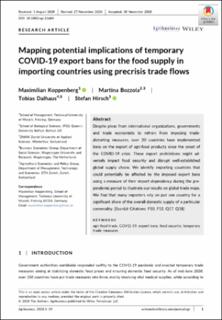Please use this identifier to cite or link to this item:
https://doi.org/10.21256/zhaw-21325| Publication type: | Article in scientific journal |
| Type of review: | Peer review (publication) |
| Title: | Mapping potential implications of temporary COVID‐19 export bans for the food supply in importing countries using precrisis trade flows |
| Authors: | Koppenberg, Maximilian Bozzola, Martina Dalhaus, Tobias Hirsch, Stefan |
| et. al: | No |
| DOI: | 10.1002/agr.21684 10.21256/zhaw-21325 |
| Published in: | Agribusiness |
| Volume(Issue): | 37 |
| Issue: | 1 |
| Page(s): | 25 |
| Pages to: | 43 |
| Issue Date: | 12-Dec-2020 |
| Publisher / Ed. Institution: | Wiley |
| ISSN: | 0742-4477 1520-6297 |
| Language: | English |
| Subjects: | Agri-food trade; COVID-19; Export bans; Temporary trade measures; Food security |
| Subject (DDC): | 338: Production |
| Abstract: | Despite pleas from international organizations, governments and trade economists to refrain from imposing trade‐distorting measures, over 20 countries have implemented bans on the export of agri‐food products since the onset of the COVID‐19 crisis. These export prohibitions might adversely impact food security and disrupt well‐established global supply chains. We identify importing countries that could potentially be affected by the imposed export bans using a measure of their import dependency during the pre‐pandemic period to illustrate our results on global trade maps. We find that many importers rely on just one country for a significant share of the overall domestic supply of a particular commodity. |
| URI: | https://digitalcollection.zhaw.ch/handle/11475/21325 |
| Fulltext version: | Published version |
| License (according to publishing contract): | CC BY 4.0: Attribution 4.0 International |
| Departement: | Life Sciences and Facility Management |
| Organisational Unit: | Institute of Natural Resource Sciences (IUNR) |
| Appears in collections: | Publikationen Life Sciences und Facility Management |
Files in This Item:
| File | Description | Size | Format | |
|---|---|---|---|---|
| 2020_Koppenberg-Bozzola_etal_Potential-implications-of-temporary-COVID-19-export-bans_agribusiness.pdf | 2.07 MB | Adobe PDF |  View/Open |
Show full item record
Koppenberg, M., Bozzola, M., Dalhaus, T., & Hirsch, S. (2020). Mapping potential implications of temporary COVID‐19 export bans for the food supply in importing countries using precrisis trade flows. Agribusiness, 37(1), 25–43. https://doi.org/10.1002/agr.21684
Koppenberg, M. et al. (2020) ‘Mapping potential implications of temporary COVID‐19 export bans for the food supply in importing countries using precrisis trade flows’, Agribusiness, 37(1), pp. 25–43. Available at: https://doi.org/10.1002/agr.21684.
M. Koppenberg, M. Bozzola, T. Dalhaus, and S. Hirsch, “Mapping potential implications of temporary COVID‐19 export bans for the food supply in importing countries using precrisis trade flows,” Agribusiness, vol. 37, no. 1, pp. 25–43, Dec. 2020, doi: 10.1002/agr.21684.
KOPPENBERG, Maximilian, Martina BOZZOLA, Tobias DALHAUS und Stefan HIRSCH, 2020. Mapping potential implications of temporary COVID‐19 export bans for the food supply in importing countries using precrisis trade flows. Agribusiness. 12 Dezember 2020. Bd. 37, Nr. 1, S. 25–43. DOI 10.1002/agr.21684
Koppenberg, Maximilian, Martina Bozzola, Tobias Dalhaus, and Stefan Hirsch. 2020. “Mapping Potential Implications of Temporary COVID‐19 Export Bans for the Food Supply in Importing Countries Using Precrisis Trade Flows.” Agribusiness 37 (1): 25–43. https://doi.org/10.1002/agr.21684.
Koppenberg, Maximilian, et al. “Mapping Potential Implications of Temporary COVID‐19 Export Bans for the Food Supply in Importing Countries Using Precrisis Trade Flows.” Agribusiness, vol. 37, no. 1, Dec. 2020, pp. 25–43, https://doi.org/10.1002/agr.21684.
Items in DSpace are protected by copyright, with all rights reserved, unless otherwise indicated.